
DACH businesses take sustainability to a new level styles-h2
data-xy-axis-lg:null; data-xy-axis-md:null; data-xy-axis-sm:70% 0%
<p><br> September 13, 2023</p>
DACH businesses take sustainability to a new level
<p><b>In this manufacturing-reliant region, businesses are ramping up their sustainability spending to intensify their focus on data-driven solutions, according to our recent research.</b></p>
<p>As in other European locations, businesses in Germany, Austria and Switzerland (DACH) are ramping up their sustainability efforts with an eye toward fast-approaching regulations such as the European Union’s Corporate Sustainability Reporting Directive (CSDR). Doing so means facing up to two key challenges: obtaining high-quality data from their internal operations and supply chains, and overcoming the region’s acute workforce shortage, including people with the required digital skills to develop the intelligence needed to manage the sustainability transition.</p> <p>In the background looms the even greater difficulty of the DACH economy’s historical reliance on automotive manufacturing, especially in Germany—and strong competition from new regions and players on the electrification of everything, most notably from China. This transformation is driven by sustainability and the scale-up of green technologies.</p> <p>In our recent study of 3,000 executives, including 204 in the DACH region, the intensified sustainability focus is apparent in the forecasted spending levels. In the study, conducted in partnership with Oxford Economics, budgets are expected to increase by an annual average of almost 11% between 2022 and 2025, and then grow again by an annual average of nearly 13% between 2025 and 2030.</p> <p>A key focus of that spending will be on shifting sustainability work from a voluntary, rule-of-thumb exercise, to a data-intensive job that enables accurate tracking and reporting, as well as effective decision making. This is particularly the case for the many businesses that have already expanded their focus to Scope 3 targets.</p> <p>The most ambitious businesses in the region have committed to reducing supply chain emissions by 50% by 2030. Such reductions will be impossible without first getting a far more granular accounting of the environmental impact of every product and service purchased, from material composition to the origin of the raw materials. This is a complex data undertaking—and a wakeup call to any company hoping to achieve their promised Scope 3 goals.</p> <p>The wakeup call is particularly relevant for DACH businesses—compared with other regions in our study, these businesses are more likely to have already expanded their sustainability focus from internal operations to the supply chain and the products and services they offer. This is not surprising given the manufacturing focus of businesses in the region.</p> <p>Already, leading automakers in Germany have joined forces to enable a secure and cross-company data exchange of all participants in the automotive value chain, dubbed Catena-X. The first use case of the initiative is to precisely map carbon emissions along the entire supply chain, including traceability of individual components. </p> <p>Technology adoption—from cloud to Internet of Things, to intelligent automation, to artificial intelligence-driven analytics—will be vital for tracking and reducing environmental impacts; this is where the digital talent shortage will pose a challenge. While DACH businesses in our study have relatively low adoption levels of these key technologies, it’s promising to see those that have deployed them report high effectiveness levels.</p> <p>We’ve developed five recommendations for how DACH businesses can outperform their markets by embedding sustainability at their core.</p> <h4>#1 Boost sustainability investments to realize full business value</h4>
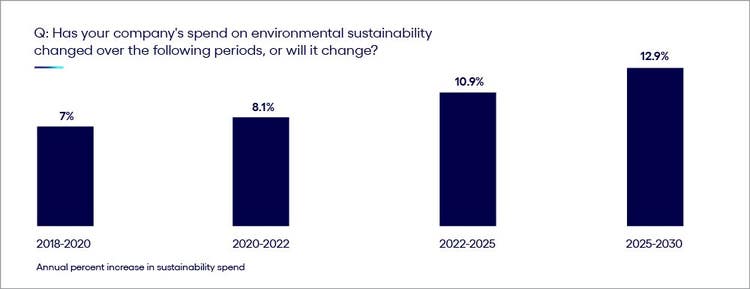
#
<p><span class="small">Source: Cognizant Research<br> Figure 1</span></p> <p>Convinced by the benefits of sustainability transformation and prompted by regulatory pressure, businesses in the DACH region have been given the green light to increase investment in their initiatives. The annual increase in budgets is expected to accelerate from 7.0% between 2018 and 2020 to 12.9% between 2025 and 2030.</p> <h4>#2 Elevate your internal sustainability initiatives for even greater returns</h4>
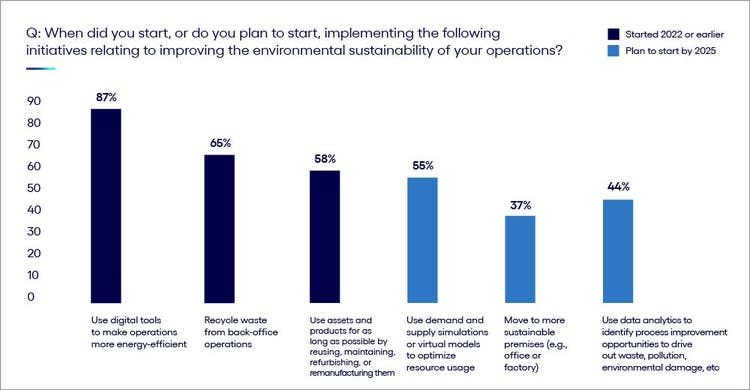
#
<p><span class="small">Source: Cognizant Research<br> Figure 2</span></p> <p>DACH businesses already recognize that digital tools are fundamental to success in their sustainability efforts, with nearly nine in 10 using them today to make operations more energy efficient. Other popular initiatives are focused on the circular economy, including recycling waste from back-office operations (65%) and reusing, repairing and remanufacturing products or assets (58%).</p> <p>Looking ahead to 2025, many have plans to make their premises more sustainable (37%). More, however, will start using digital twins (55%) and data analytics (44%) to identify green process improvements, reflecting the acknowledged power of digital to meet sustainability goals.</p> <h4>#3 Expand your sphere of influence, upstream and downstream, to achieve greater business benefits and impact</h4>
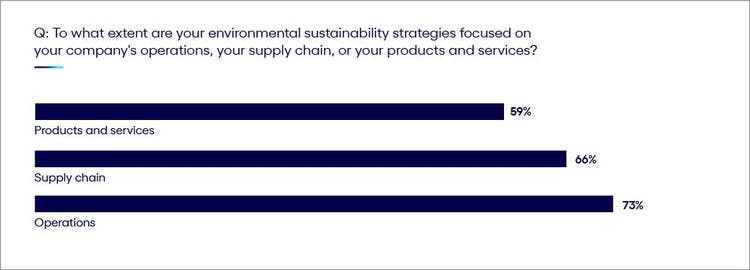
#
<p><span class="small">Source: Cognizant Research<br> Figure 3</span></p> <p>Almost three-quarters (73%) of DACH respondents said their organization’s sustainability strategy is greatly focused on operations, compared with 66% for supply chain and 59% for products and services. Although the latter two findings are higher than any other geography surveyed, there remains a bias toward internal operations over the external value chain. This is completely justifiable as it stems from the confidence and control businesses can exert in this area.</p> <p>Conversely, it’s more difficult to effect change in areas traditionally out of their own control, such as the complexities of modern supply chains or the afterlife of a product once in the customer’s hands. Using digital technologies, however, DACH businesses can extend their reach, gaining visibility and influence across the entire value chain.</p> <h4>#4 Explore new ways to apply and deploy mature and emerging technology</h4>
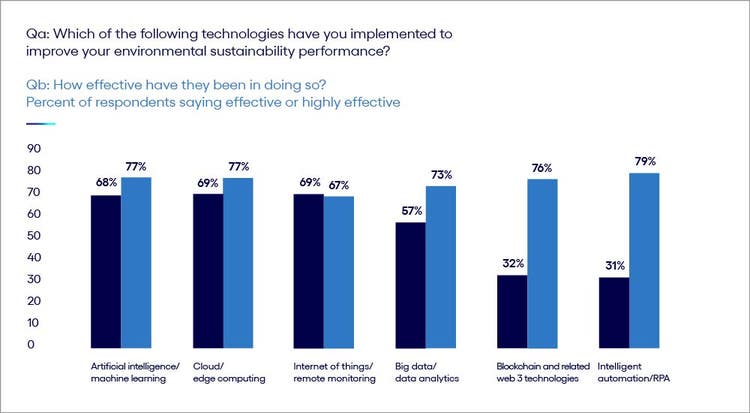
#
<p><span class="small">Source: Cognizant Research<br> Figure 4</span></p> <p>DACH businesses are unique among the businesses in other geographies surveyed in their ability to realize the effectiveness of the technologies most widely implemented to stimulate their sustainability efforts, including artificial intelligence (68%), cloud (69%) and IoT (69%). However, some less deployed technologies may be even more impactful. Although only 31% of DACH businesses have applied intelligent automation, for example, almost eight in 10 of those that have say it’s effective.</p> <h4>#5 Evolve power structures to allow for necessary shifts in culture and accountability</h4>
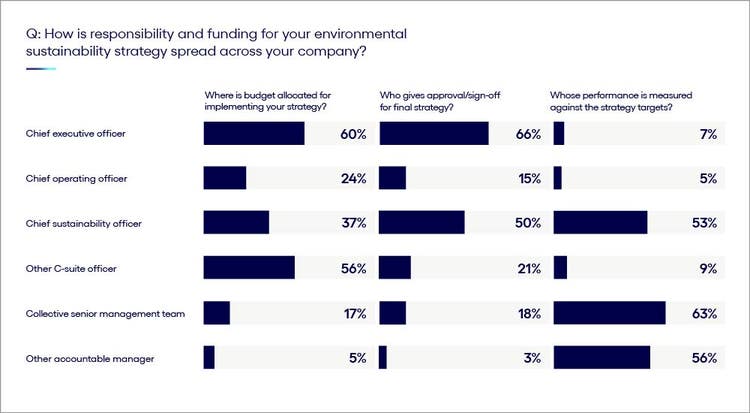
#
<p><span class="small">Source: Cognizant Research<br> Figure 5</span></p> <p>While it’s primarily CEOs in the DACH region who allocate budget (60%) and approve the sustainability strategy (66%), very few (less than 10%) are accountable or have their performance measured against the strategy’s success. Instead, it’s the chief sustainability officer (CSO) and senior managers who are responsible for outcomes, despite their absence from the strategy table.</p> <p>To embed sustainability into company culture, businesses must clarify roles and responsibilities, and clearly connect these to an incentives system to encourage senior leaders and all employees to participate in sustainability endeavors.</p> <p><i>Learn how your business (or you) can become sustainable to the core </i><a href="https://www.cognizant.com/us/en/insights/perspectives/sustainability-in-business-beyond-green-to-deeply-green-wf1518050" target="_blank" rel="noopener noreferrer"><i>in our report</i></a><i> “Deep Green: How data, technology and collaboration will drive the next phase of sustainability in business.”</i></p> <p><i>For even more on this topic, visit our </i><a href="https://www.cognizant.com/us/en/insights/sustainability-resilience" target="_blank" rel="noopener noreferrer"><i>Sustainability & Resilience webpage</i></a><i>.</i></p> <p><i>This article was written by Jan Konietzko, Sustainability Expert and Manager in Cognizant’s Sustainability Practice.</i></p>
<p>We’re here to offer you practical and unique solutions to today’s most pressing technology challenges. Across industries and markets, get inspired today for success tomorrow.</p>
